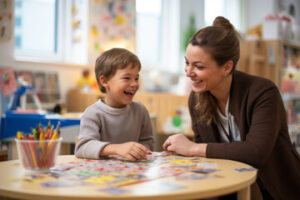What Kind of Child’s Therapy Is Right For Your Child?
Child counseling offers an outlet for children with social and emotional issues and psychological distress. It teaches them that talking about their feelings is okay and gives them tools they can use in the future.
It’s important to find a counselor with credentials and great references.
During talk therapy, the therapist asks the child questions about what is bothering them and helps them express their thoughts and feelings in a safe environment. This type of therapy can help children to gain a better understanding of their problems and how they affect them at home, in school, and within the family. It can also provide them with tools that they can use to solve their problems on their own.
It is important to find a counselor who you and your child feel comfortable with. You should check a potential counselor’s credentials – training qualifications, approach to treatment, and client reviews. You should also make sure that they specialize in child counseling. Once you have found a counselor that you feel comfortable with, it is important to schedule regular appointments with them. This will help your child to become accustomed to the sessions and learn the skills that they need to cope with their problems.
In addition to individual sessions, children can also undergo family or group therapy. This type of therapy is helpful for children who have a hard time communicating with their parents or siblings, and it can help them to develop healthy communication skills. It can also be effective for children who have a difficult time coping with separation, divorce, and other life events.
During the COVID-19 pandemic, many children needed help making sense of the changes that were happening around them. They could experience a wide range of emotions, including anxiety, sadness, fear, depression, self-doubt, guilt, and anger/rage. These feelings were normal, but for many kids they were overwhelming. This is when child counseling came into play, and this type of therapy has been especially beneficial to children with cognitive or intellectual disabilities.
A child counselor can help a child to build their self-esteem and confidence by teaching them the benefits of positive self-talk. They can also teach them how to take a “time-out” when they are feeling stressed or overwhelmed, and how to practice relaxation techniques. They can also teach a child how to express their feelings and concerns to a trusted friend or family member.
Play Therapy
Play therapy allows children to explore their thoughts, emotions and behaviors in a natural setting. Therapists create a safe space for children to work through issues, such as anxiety, depression, anger, interpersonal problems and attention deficit hyperactivity disorder (ADHD).
In play therapy sessions, a trained therapist observes a child as they interact with toys that are meant to encourage self-expression. For example, a young client may play with dolls or use puppets to act out scenarios that mirror real-life situations. For example, if the child plays a scene of bullying, the therapist may interject to teach them ways to respond in a more positive way.
A therapist might also incorporate other activities, such as art or storytelling. The therapist may also get involved in the play to help direct it. In addition, they can give the child “homework” to practice outside of the session. This is called bibliotherapy or parent-child therapy, and it helps to strengthen the relationship between child and therapist.
Jeff notes that a key benefit of play therapy is its ability to help clients discover their strengths. For example, if a child is playing with toys that are challenging to master, such as a xylophone or drum set, the therapist can encourage them to continue trying even when they have failed. This can help a client develop a stronger sense of self-worth.
In addition to learning about their own strengths, a client may discover new coping skills through play therapy. For example, if they have difficulty staying focused or sitting still, the therapist may help them use their imagination to create scenes of situations that take place in their real life. This can teach them to recognize when hyperactivity takes place and how to manage it in a more healthy way.
Play therapy can be used for both individual and group therapy. It is particularly effective in treating adolescents and children whose emotional or behavioral difficulties are caused by family problems, such as divorce, loss, abuse or neglect. It can also help them cope with developmental or environmental changes, such as a move to a new school or home.
Cognitive Behavioral Therapy (CBT)
For children and adolescents experiencing emotional, behavioral, or relationship problems, child therapy is often a helpful tool. Whether they’re struggling with depression, anxiety, mood disorders, ADHD, self-harm, bullying or a family breakdown, the help of a licensed therapist can provide them with tools and skills to cope and improve.
There are a number of different types of therapy for kids and teens, including individual, group and family therapy. In family therapy, counselors work with the entire family to improve communication and relationships. Individual therapy for kids and teens gives them a chance to discuss their feelings one-on-one with the therapist. This is often done through therapeutic play or conversations about how their behavior affects them and others.
Cognitive Behavioral Therapy (CBT) is a form of talk therapy that helps improve moods and behaviors by changing the way people think. CBT therapists use short-term, goal-oriented treatments to help kids and adults change negative thoughts into more positive ones. Specialized forms of this therapy, such as trauma-focused cognitive behavioral therapy, are also available to help kids and adolescents recover from traumatic experiences.
Another type of CBT is called child-centered play therapy, which involves interacting with children while they play in a safe and controlled environment. Using toys and the counseling relationship, the therapist can help them explore their feelings, identify unhealthy patterns of thinking, and replace those thoughts with more appropriate ones to improve their moods and behavior.
For children and teens who struggle with anger or aggression, there’s also a type of CBT called Parent-Child Interaction Training (PCIT). This consists of the therapist watching parents interact with their kids and coaching them on how to set boundaries, avoid emotional escalation, and teach self-regulation. It’s a short-term treatment, but it can have great results for kids who have trouble controlling their emotions.
Psychodynamic Therapy
Psychodynamic therapy is a form of child counseling that explores unconscious processes and unresolved conflicts in relationships. This type of child therapy helps kids and their families find better ways to communicate, solve problems, and cope with negative emotions like anger or sadness. It can also be used in combination with other forms of treatment to help address specific mental health disorders.
Children and teenagers often need professional help when they are struggling to manage life changes, or are experiencing a range of emotional issues that include anxiety, depression, self-doubt, fear and/or phobia, and/or feelings of anger or rage. Having a counselor who can provide support and guidance can help them navigate the difficulties of these changes and improve their quality of life.
Counselors who specialize in working with kids and teens are called child therapists or child psychologists (depending on the level of education and licensure). They have been trained to understand the unique needs and challenges of children and adolescents.
In addition to traditional talk and play therapies, child therapists use a variety of techniques to engage kids and teens in the therapeutic process. Some of these include mindfulness, cognitive behavioral therapy (CBT), and trauma-focused CBT. Mindfulness helps kids and teens become more aware of their thoughts, feelings, and behaviors so they can identify distorted and harmful patterns and replace them with healthy ones. CBT teaches children how their thoughts and feelings influence their mood and behavior, as well as how to practice skills that can be used outside of therapy sessions to improve daily functioning.
A therapist may also employ family therapy to help kids and their families develop healthier communication and problem-solving skills. This type of child counseling can be very effective when there are significant obstacles in the relationship between a parent and their child. In the session, the therapist can work with both the parents and the child together, or with one parent and the child individually.
Another highly effective form of child counseling is Parent-Child Interaction Therapy (PCIT). This program is a structured intervention that focuses on helping parents learn how to manage their kids’ out-of-control tantrums and meltdowns, improve communication, and reduce aggression. This type of child therapy is typically conducted over the course of 12-15 weeks and can be done in person or online.






